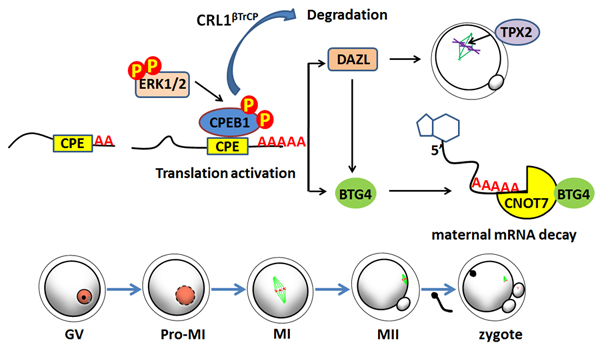Mammalian oocyte maturation depends on the translational activation of stored maternal mRNAs upon meiotic resumption. Cytoplasmic polyadenylation element binding protein-1 (CPEB1) is a key oocyte factor that regulates maternal mRNA translation. However, the signal that triggers CPEB1 activation at the onset of mammalian oocyte maturation was unclear before. Dr. Fan’s group provides evidence that mitogen-activated protein kinase (MAPK) cascade couples maternal mRNA translation to meiotic cell cycle progression in mouse oocytes, by triggering CPEB1 phosphorylation and degradation. CPEB1 is phosphorylated and partially degraded soon after germinal vesicle breakdown. Mutations of the phosphorylation sites or ubiquitin E3 ligase binding sites in CPEB1 have a dominant negative effect in oocytes, and mimic the phenotype of ERK1/2 knockout, by impairing spindle assembly and mRNA translation. Inhibition or knockout of ERK1/2 blocked CPEB1 phosphorylation and degradation, as well as meiotic maturation-coupled translation of CPEB1-target mRNAs including Dazl, Tpx2, and Btg4. Overexpression of the CPEB1-downstream translation activator DAZL in ERK1/2-deficient oocytes partially rescued their meiosis defects, indicating that ERK1/2 are essential for spindle assembly, metaphase II arrest, and maternal-zygotic transition (MZT) primarily by triggering the translation of these key maternal mRNAs. Particularly, ERK1/2 and CPEB1 lead to the accumulation of the mRNA degradation activator BTG4 and the mRNA deadenylase CNOT7, therefore forming a negative feedback loop that are essential for the temporal expression of maternal mRNAs during MZT. Taken together, ERK1/2-mediated CPEB1 phosphorylation/degradation is a major mechanism of maternal mRNA translational activation, and is crucial for mouse oocyte maturation and MZT.

The full length paper can be find at: http://dev.biologists.org/content/early/2016/12/17/dev.144410



